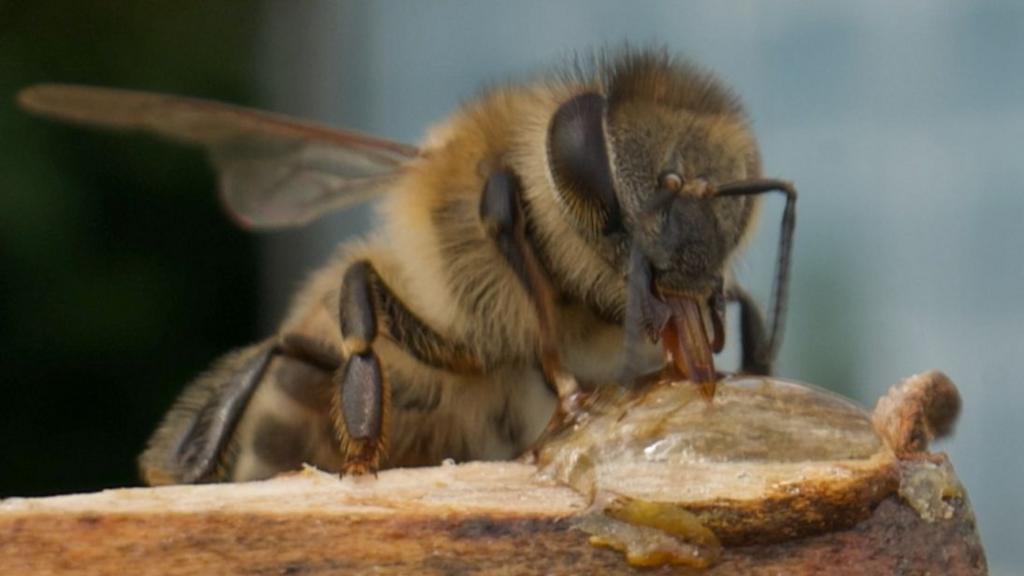Scientists have engineered a novel “superfood” for honeybees, potentially offering a vital defense against the escalating threats of climate change and habitat degradation.
Trials involving bee colonies consuming the supplement demonstrated a significant increase, with up to 15 times more young bees reaching adulthood.
Honeybees play a crucial role in global food production, contributing to the pollination of approximately 70% of the world’s leading crops.
Professor Geraldine Wright at the University of Oxford, the senior author of the study, stated to BBC News, “This technological breakthrough provides all the nutrients bees need to survive, meaning we can continue to feed them even when there’s not enough pollen.”
She added, “It really is a huge accomplishment.”
Globally, honeybee populations are experiencing severe declines, attributed to factors such as nutrient deficiencies, viral diseases, and the impacts of climate change. In the US, annual colony losses have ranged between 40-50% in the past decade, with expectations of further increases.
Beekeepers in the UK have also encountered substantial challenges.
Nick Mensikov, chair of the Cardiff, Vale and Valleys Beekeepers Association, reported to BBC News that he lost 75% of his colonies last winter, a trend observed across South Wales.
“Although the hives have all been full of food, the bees have just dwindled. Most of the bees survived through January, February, and then they just vanished,” he explained.
Honeybees rely on pollen and nectar from flowers, which provide essential nutrients, including lipids known as sterols, crucial for their development.
They produce honey within their hives, which serves as a primary food source during winter when flowers cease pollen production.
When beekeepers harvest honey for sale, or when pollen availability is limited, they often supplement the insects’ diet.
However, this supplementary food, typically composed of protein flour, sugar, and water, has historically lacked the full spectrum of nutrients bees require, akin to a human diet deficient in carbohydrates, amino acids, and other vital elements.
Sterols have proven particularly challenging to manufacture. Prof. Wright led a 15-year research effort to precisely identify the sterols necessary for bee health and develop methods for their production.
At the University of Oxford lab, PhD student Jennifer Chennells demonstrated the bee feeding process within incubators, utilizing various food formulations she had created.
She employs standard kitchen equipment to prepare the raw ingredients, forming them into glossy, white tubes of food.
“We put ingredients into what’s like a cookie dough, with different proteins, fats, different amounts of carbohydrate, and the micronutrients that bees need. It’s to try to work out what they like best and what’s best for them,” she stated.
These tubes are placed inside the bee enclosures, where the insects consume the mixture.
Within this laboratory, Prof. Wright’s team successfully employed gene editing to engineer a yeast capable of producing the six essential sterols for bees.
“It’s a huge breakthrough. When my student was able to engineer the yeast to create the sterols, she sent me a picture of the chromatogram that was a result of the work,” she recounted, referencing the structural analysis chart.
“I still have it on the wall of my office,” she added.
The “superfood” was administered to bees within the lab’s hives for a period of three months.
Results indicated that colonies receiving the enhanced food source exhibited up to a 15-fold increase in the number of young bees reaching adulthood.
“When the bees have a complete nutrition they should be healthier and less susceptible to disease,” Prof. Wright explained.
Prof. Wright suggested that this nutritional supplement could be particularly beneficial during summers characterized by early cessation of flowering plant production.
“It’s really important in years when the summer came early and bees will not have sufficient pollen and nectar to make it through the winter,” she said.
“The more months that they go without pollen, the more nutritional stress that they will face, which means that the beekeepers will have greater losses of those bees over winter,” she elaborated.
While larger-scale trials are now necessary to fully evaluate the long-term impacts of this food source on honeybee health, the supplement could potentially be available to beekeepers and farmers within the next two years.
The research was spearheaded by the University of Oxford, in collaboration with the Royal Botanic Gardens Kew, the University of Greenwich, and the Technical University of Denmark.
The research is published in the journal Nature.
Warnings for some ’emerging’ food allergens should be added to food packaging, researchers suggest.
The Heather Trust says heather beetles lay more larvae in warmer weather which strip the flower.
The event was part of a Portsmouth City Council programme to support and promote local businesses.
The mobile food initiative is serving between 800 and 1,000 potatoes a week to families in need.
As an authoritarian China tries other forms of soft power, a sumptuous table may be a useful draw.

